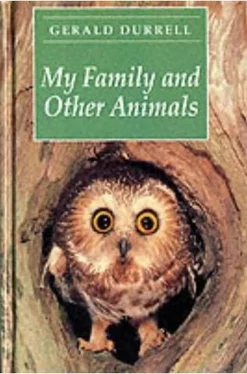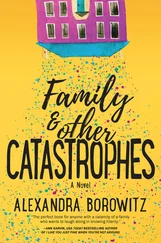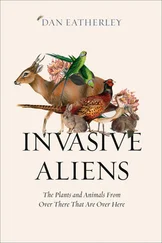'They are dear little things, robins,' said Mother. "There was one in England that used to spend hours by me when I was gardening. I love the way they puff up their little chests.'
'The way that one bobbed looked exactly as if he was bowing,' said Theodore. 'I must say when he ... er ... puffed up his chest he looked very like a rather... you know ... a rather outside opera singer.'
'Yes, singing something rather frothy and light. . . . Strauss, I should think,' agreed Larry.
'Talking of operas,' said Theodore, his eyes gleaming, 'did I ever tell you about the last opera we had in Corfu?’
We said no, he hadn't told us, and settled ourselves comfortably, getting almost as much amusement from the sight of Theodore telling the story as from the story itself.
'It was . . . um . . . one of those travelling opera companies, you know. I think it came from Athens, but it may have been Italy. Anyway, their first performance was to be Tosca. The singer who took the part of the heroine was exceptionally ... er ... well developed, as they always seem to be. Well, as you know, in the final act of the opera the heroine casts herself to her doom from the battlements of a fortress -or, rather, a castle. On the first night the heroine climbed up on to the castle walls, sang her final song, and then cast herself to her . . . you know . . . her doom on the rocks below. Unfortunately it seems that the stage hands had forgotten to put anything beneath the walls for her to land on. The result was that the crash of her landing and her subsequent ... er ... yells of pain detracted somewhat from the impression that she was a shattered corpse on the rocks far below. The singer who was just bewailing the fact that she was dead had to sing quite... er... quite powerfully in order to drown her cries. The heroine was, rather naturally, somewhat upset by the incident, and so the following night the stage hands threw themselves with enthusiasm into the job of giving her a pleasant landing. The heroine, somewhat battered, managed to hobble her way through the opera until she reached the ... er ... final scene. Then she again climbed on to the battlements, sang her last song, and cast herself to her death. Unfortunately the stage hands, having made the landing too hard on the first occasion, had gone to the opposite extreme. The huge pile of mattresses and ... er . . . you know, those springy bed things, was so resilient that the heroine hit them and then bounced up again. So while the cast was down at the ... er ... what d'you call them? ... ah, yes, the footlights, telling each other she was dead, the upper portions of the heroine reappeared two or three times above the battlements, to the mystification of the audience.'
The robin, who had hopped nearer during the telling of the story, took fright and flew off again at our burst of laughter.
'Really, Theodore, I'm sure you spend your spare time making up these stories,' protested Larry.
'No, no,' said Theodore, smiling happily in his beard; 'if it were anywhere else in the world I would have to, but here in Corfu they... er... anticipate art, as it were.'
Tea over, Theodore and I returned to the lake's edge once more and continued our investigation until it grew too shadowy to see properly; then we walked slowly back to the beach, where the fire Spiro had built pulsed and glowed like an enormous chrysanthemum among the ghostly white lilies. Spiro, having speared three large fish, was roasting them on a grid, absorbed and scowling, putting now a flake of garlic, now a squeeze of lemon-juice or a sprinkle of pepper on the delicate white flesh that showed through where the charred skin was starting to peel off. The moon rose above the mountains, turned the lilies to silver except where the flickering flames illuminated them with a flush of pink. The tiny ripples sped over the moonlit sea and breathed with relief as they reached the shore at last. Owls started to chime in the trees, and in the gloomy shadows fireflies gleamed as they flew, their jade-green, misty lights pulsing on and off.
Eventually, yawning and stretching, we carried our things down to the boats. We rowed out to the mouth of the bay, and then in the pause while Leslie fiddled with the engine, we looked back at Antiniotissa. The lilies were like a snow-field under the moon, and the dark backcloth of olives was pricked with the lights of fireflies. The fire we had built, stamped, and ground underfoot before we left, glowed like a patch of garnets at the edge of the flowers.
'It is certainly a very ... er... beautiful place,' said Theodore with immense satisfaction.
'It's a glorious place,' agreed Mother, and then gave it her highest accolade, 'I should like to be buried there.'
The engine stuttered uncertainly, then broke into a deep roar; the Sea Cow gathered speed and headed along the coastline, trailing the Bootle-Bumtrinket behind, and beyond that our wash fanned out, white and delicate as a spider's web on the dark water, flaming here and there with a momentary spark of phosphorescence.
CHAPTER SEVENTEEN
The Chessboard Fields
BELOW the villa, between the line of hills on which it stood and the sea, were the Chessboard Fields. The sea curved into the coast in a great, almost landlocked bay, shallow and bright, and on the flat land along its edges lay the intricate pattern of narrow waterways that had once been salt pans in the Venetian days. Each neat little patch of earth, framed with canals, was richly cultivated and green with crops of maize, potatoes, figs, and grapes. These fields, small coloured squares edged with shining waters, lay like a sprawling, multi-coloured chessboard on which the peasants' coloured figures moved from place to place.
This was one of my favourite areas for hunting in, for the tiny waterways and the lush undergrowth harboured a multitude of creatures. It was easy to get lost there, for if you were enthusiastically chasing a butterfly and crossed the wrong little wooden bridge from one island to the next you could find yourself wandering to and fro, trying to get your bearings in a bewildering maze of fig-trees, reeds, and curtains of tall maize. Most of the fields belonged to friends of mine, peasant families who lived up in the hills, and so when I was walking there I was always sure of being able to rest and gossip over a bunch of grapes with some acquaintance, or to receive interesting items of news, such as the fact that there was a lark's nest under the melon-plants on Georgio's land. If you walked straight across the chessboard without being distracted by friends, side-tracked by terrapins sliding down the mud banks and plopping into the water, or the sudden crackling buzz of a dragon-fly swooping past, you eventually came to the spot where all the channels widened and vanished into a great flat acreage of sand, moulded into endless neat pleats by the previous night's tides. Here long winding chains of flotsam marked the sea's slow retreat, fascinating chains full of coloured seaweed, dead pipe-fish, fishing-net corks that looked good enough to eat - like lumps of rich fruit cake - bits of bottle-glass emeried and carved into translucent jewels by the tide and the sand, shells as spiky as hedgehogs, others smooth, oval, and delicate pink, like the finger-nails of some drowned goddess. This was the sea-birds' country: snipe, oyster-catcher, dunlin, and terns strewn in small pattering groups at the edge of the sea, where the long ripples ran towards the land and broke in long curving ruffs round the little humps of sand. Here, if you felt hungry, you could wade out into the shallows and catch fat, transparent shrimps that tasted as sweet as grapes when eaten raw, or you could dig down with your toes until you found the ribbed, nut-like cockles. Two of these, placed end to end, hinge to hinge, and then twisted sharply in opposite directions, opened each other neatly; the contents, though slightly rubbery, were milky and delicious to eat.
Читать дальше











